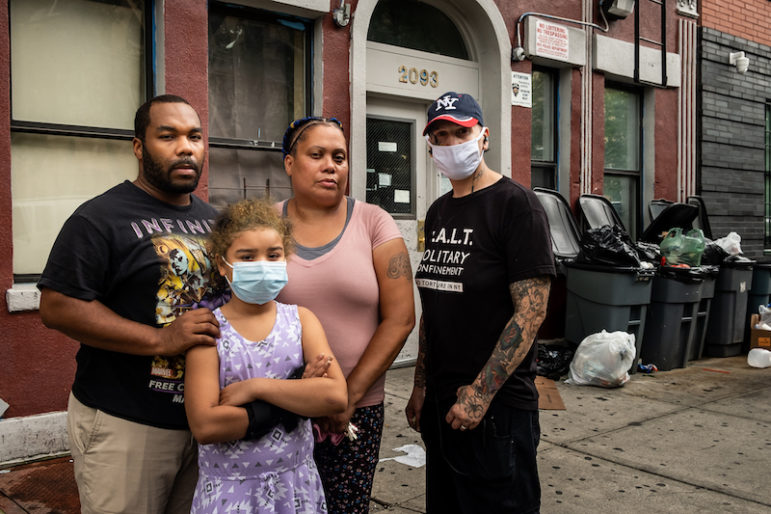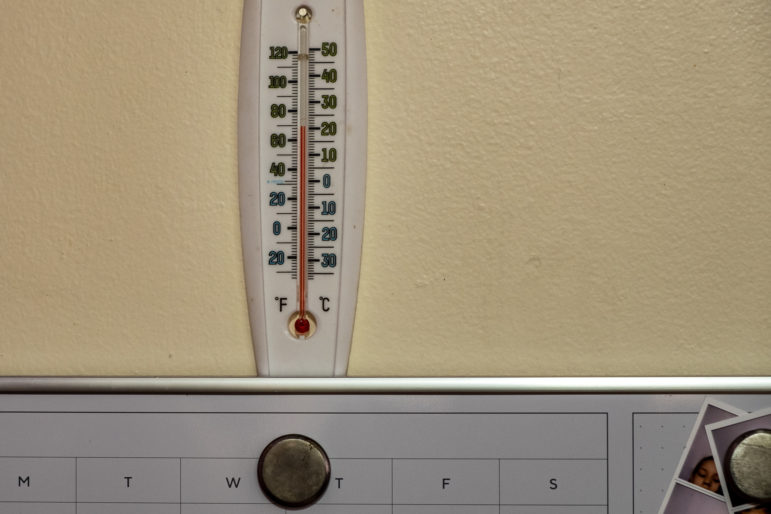Dead rodents, broken lights and missing smoke detectors are among the issues at one property moved out of the controversial housing program.

Adi Talwar
Some residents of 2093 Madison Ave in East Harlem. Left to right, Anthony Brooks with his fiance Lucy Torres’ 8-year-old daughter, Rosa Marie Febo and Angel.The new apartment on Madison Avenue in Harlem was supposed to be a fresh start for Lucy Torres and her 8-year-old daughter.
After months in a shelter, the Department of Homeless Services offered the family a unit in a so-called cluster site building that the city had purchased in February and converted to permanent housing. Her fiance Anthony Brooks was able to move in, too.
“I was assured and promised that the apartment was done. The application said ‘brand new, inspected,’” says Torres, who works as an assistant at a medical clinic in Bensonhurst.
Instead, she and Brooks spent two days cleaning out the unit and scrubbing the spots where dead rats had started decomposing, she says.
Conditions have hardly improved over the past seven months. Some cabinets are singed, others are water-warped. A broken light fixture dangles from a wire in the kitchen, next to the empty space where a smoke detector is supposed to go. The apartment was one of at least four units with young children that were missing smoke detectors when City Limits visited on Aug. 25.
Their experiences, shared by several tenants in the 20-unit building at 2093 Madison Avenue, expose some of the lingering problems at a former cluster site building converted to permanent use by the city.
“We try to be grateful because we’re not in a shelter, but what’s the limit?” Torres says. “We’re mothers with children and it’s despicable. We just want a better life.”
Aftermath of a program
Before the purchase, when it was in the cluster-site program, the city had been subsidizing the landlord to house homeless families in the units, with no clear path to permanent housing. A policy initiated in the final months of the Giuliani administration, cluster sites became notorious for slumlord owners, shady service providers and unsafe conditions, including a burst steam pipe that scalded and killed two young girls in 2016.
In a move widely praised by homeless advocates, Mayor Bill de Blasio committed to ending the use of cluster sites by 2021 in his “Turning the Tide on Homelessness” plan, though that deadline may prove too aspirational. So far, the city has converted 70 percent of the cluster site buildings to permanent use.
The Harlem property where Torres lives was one of 14 cluster sites that the city purchased for $74.5 million in February. The building sold for a little over $6.6 million, according to property records. The city’s Department of Housing Preservation and Development (HPD) worked with the New York City Housing Development Corporation and a nonprofit, Samaritan Village, to convert the cluster site to a permanent apartment for families experiencing homelessness.
Seven months after the 2093 Madison Avenue conversion, tenants in 11 apartments have organized to demand the renovations they say they were promised from the start. In a petition to Samaritan Village, they list a litany of unsafe, unsanitary and inappropriate conditions. They have also documented the problems in 137 HPD complaints since Feb. 4.
Rats routinely flood the basement, especially as the garbage piles up. They’re not the only unwanted guests. Thieves occasionally stroll in through the unlocked storm doors or break in to small children’s bedrooms via the fire escape.
Refrigerators and stoves don’t work. Walls have not been painted. Floors are shoddily tiled. Bathroom fixtures aren’t attached to the walls. Roaches and black flies invade the units.
“This is unhealthy and unfair to every resident living within this establishment paying rent and not getting proper management/maintenance,” the tenants’ petition reads. “Whenever residents call management they are very unprofessional, while we are given a bill to pay rent but no work has been provided when we needed.”
Worries about security
A group of residents pointed out several of the problems throughout the building during a reporter’s visit on August 25. Each tenant said they were promised much more before they moved in.
“They told me they’d renovate it all and make it brand new,” says a first-floor tenant named Angel. She led a tour of the basement, stopping to note a dead rat, a room full of rodent droppings and the unlocked door leading to the courtyard.
Angel and a handful of other tenants asked not to have their full names published because they are survivors of domestic violence.
“No one would sign a lease if they knew nine months later that everything would be exactly the same,” says Ashley, a college student who lives on the fourth floor.
Earlier in the month, a man scaled the fire escape and broke into the bedroom Ashley shares with her two daughters. One young girl sleeps on a pink mattress on the floor. They scared the man off, but the break-in terrified her and her daughters, she says.
The tenants question why the city has not held the two companies accountable for the improvements and safety after shepherding the purchase and conversion.
Fixes coming?
Samaritan Village declined to comment for this story and directed questions to HPD. The management company HSC Management did not respond to the emails and phone calls.
HPD says it has made reserve cash available to address the most pressing health and safety issues until more renovations can be financed. Officials say the agency is ensuring that new smoke detectors are installed and inspectors visit the site.
HPD spokesperson Jeremy House says the agency is “taking seriously” its commitments to families that have experienced homelessness.
“The city plans to finance the rehabilitation of this development and is working with non-profit partners to complete as soon as possible,” House says. “Meanwhile, HPD will continue working with management to make health and safety repairs while providing the safe, secure affordable housing families need to get back on their feet.”
Despite the ongoing problems, tenants and advocates acknowledge that permanent housing — even dirty, cramped units — is better than a space in a temporary homeless shelter.
That’s not enough to justify the conditions at the Harlem apartment building, says Coalition for the Homeless Policy Director Giselle Routhier.
“The city still has a responsibility to follow through on its commitment to repair the conditions in cluster units so formerly homeless families can have access to safe, affordable housing,” says Routhier, whose organization has long advocated for converting cluster sites to permanent apartments.
An outlier, but still a worry
Legal Aid staff attorney Joshua Goldfein has represented and helped organize tenants in various cluster site apartments, as well as buildings converted to permanent housing. He said the lingering problems at 2093 Madison Avenue seem uniquely extensive.
HPD violation records seem to support Goldfein’s perspective. The 137 complaints filed by tenants at 2093 Madison Avenue far exceed the number of complaints on record at the other 13 cluster sites purchased by the city in February. Less than a block away, tenants at 27 East 131st St. at the corner of Madison Avenue, have filed six complaints since Feb. 1. Another nearby property at 475 West 145th St. has 45 complaints since Feb. 5, while 817-819 East 178th St. in the Bronx has 46. At 148 West 124th St., there have been 17 complaints over the same period; at 2153 5th Avenue, just four.
Goldfein called on the city and the landlords to improve conditions at 2093 Madison Avenue, and all the converted cluster sites.
“We think it’s important for the city to take control of these properties that have been mismanaged,” he says. “But the not-for-profit providers have to meet their obligations to ensure that the apartments are properly maintained for the people who are living there.”
First-floor tenant Rosa Marie Febo and her daughter previously lived in a Howard Beach shelter hotel and commuted to Northern Manhattan for her daughter’s school and the Bronx for her own cancer treatment. She now sleeps on a pull-out couch while her daughter claims a space in a closet-like alcove at the back of the narrow studio.
She says having a permanent home with a lease is certainly better than shelter instability, but her actual living conditions have barely improved.
“I would never do another shelter, but this building’s disgusting,” Febo says. “They could at least make it decent.”









6 thoughts on “No Longer a ‘Cluster Site,’ But Problems Remain for Tenants”
They need to move all of us to another building. The crackhead terrorize us. Drugs sold all night out the Lincoln Deli next to the building. This is too extensive. Our lives are in danger here.
It’s sad that ppl must live that way. Help them get into better affordable housing.
I empathize, I too am formally homeless found what I thought to be a great 1 br. apt. in Staten Island. There is no insulation in the walls so I may as well be living in a room. The next door neighbor opens/slams dresser draws constantly. Also opens/slams sliding closet doors. Then there’s the thumping of led boots walking back and forth 1/2 thr night. The upstairs neighbor sits her toddler on a bare floor, gives her hard toys which she throws around, scratching them on the floor all day. The upstairs neighbor has a patio of which my bedroom window looks out onto. Racoons tear through the garbagr bags leaving food all ocer right outside my windiw. It may take weeks for thrn to clean it up. They put a hammock & rebounder right in front if my window. I am not even able to open my curtains to get sunlight due to my utter disgust to see what fresh hell awaits. Last night the neighbor washed close, which led to a flood in my apt. I was wake till 3am waiting for Roto Rooter to finish. Landlord only cares about the rent.
This is Angel featured in the article. HSC Management has been working diligently trying to fix this building as it was just recently converted to family housing. When Covid 19 hit us all work orders were put on hold.
I want to note that to date HSC Management has visited the site personally and agencies who are able to work now that the states ban on social distancing is being lifted progress is starting to be made.
The crime in East Harlem, the use of fake bldg inspector to gain access to the bldgs residents, and the area use of drugs is the NYPD fault. Not HSC Management! If you want to help us at 2093 Madison Station a mobile police unit here.